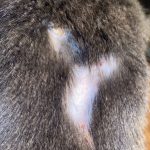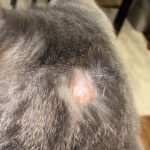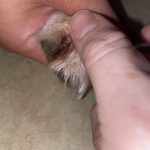Hi Grace – do you know *what* tests were done? Did they do a skin scrape? It’s odd that it’s such a specific patch…does it recur in the same place?
Honestly, after so many visits to your generalist with no answers, I’d be looking for a veterinary dermatologist – they can be found at vet schools, usually, but may be found at local Pet ERs. If you’re in Maryland, I know the vet school in Salisbury should have someone specializing in it. I know UPenn’s vet school also has someone. Search for veterinary dermatology near you.















Hello,
There are a few things that I am not completely clear about.
The lipoma was not inside the abdomen it was between the skin and the abdomen. It is far more common to be here then inside rhe abdominal cavity. Also you wouldn’t get these seromas inside rhe abdomen.
Next seromas shouldn’t be painful. Maybe get in the way of using there, but not painful.
Lastly I only use a Darin of it is infected. And even then I am not an over ambitious drain user. It’s doctor preference.
Last I think it would be better for you to get a second opinion. Everyone might feel better with it
Good luck.